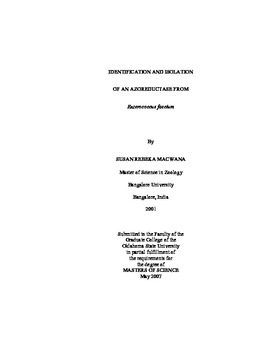| dc.contributor.advisor | John, Gilbert H. | |
| dc.contributor.author | Macwana, Susan Rebaka | |
| dc.date.accessioned | 2014-04-15T20:25:36Z | |
| dc.date.available | 2014-04-15T20:25:36Z | |
| dc.date.issued | 2007-05-01 | |
| dc.identifier.uri | https://hdl.handle.net/11244/8924 | |
| dc.description.abstract | Azo dyes are commonly used in the paper, textile, plastic, pharmaceutical, food, cosmetic, enamels, and drug industries. When these dyes enter the human body either by environmental contamination or from ingestion of food and drugs they are reduced to colorless end products by intestinal microflora or the liver into aromatic amines which are potential carcinogens. The enzyme responsible for this reaction is azoreductase (Levine, 1991; Chung et al., 1992; Platzek et al., 1999). The human intestinal flora play an important role in the metabolism of xenobiotics and azo dyes with azo reduction being the most important reaction related to the toxicity and mutagenicity of these compounds. Enterococcus faecium which is part of the intestinal flora can reduce the azo dyes to colorless products. The acpD gene was identified, cloned, expressed and the recombinant protein was extracted and tested for azoreductase activity.Enterococcus faecium showed to reduce the azo dyes Direct blue 15, Methyl red and Tartrazine, both visually and spectrophotometrically. When the acpD gene was isolated, cloned and expressed it yielded a protein of approximately 23kDa. Spectrophotometric analysis of the protein showed that Flavins are associated with the protein. Time course experiments revealed that the enzyme could reduce the monoazo dye Methyl red and the specific activity for the enzyme was highest with the use of 17?M dye and 0.1mM NADH. The optimum temperature and pH for the activity of the enzyme was found to be 38�C and a pH of 8. | |
| dc.format | application/pdf | |
| dc.language | en_US | |
| dc.publisher | Oklahoma State University | |
| dc.rights | Copyright is held by the author who has granted the Oklahoma State University Library the non-exclusive right to share this material in its institutional repository. Contact Digital Library Services at lib-dls@okstate.edu or 405-744-9161 for the permission policy on the use, reproduction or distribution of this material. | |
| dc.title | Identification and Isolation of an Azoreductase from Enterococcus faecium | |
| dc.type | text | |
| dc.contributor.committeeMember | Fathepure, Babu | |
| dc.contributor.committeeMember | Hadwiger, Jeff | |
| osu.filename | Macwana_okstate_0664M_2337.pdf | |
| osu.college | Agricultural Sciences and Natural Resources | |
| osu.accesstype | Open Access | |
| dc.description.department | Department of Biochemistry and Molecular Biology | |
| dc.type.genre | Thesis | |
